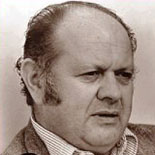 Richard Hugo (December 21, 1923 – October 22, 1982), born Richard Hogan, was an American poet.
Richard Hugo (December 21, 1923 – October 22, 1982), born Richard Hogan, was an American poet.
DEGREES OF GRAY IN PHILIPSBURG
Richard Hugo
You might come here Sunday on a whim.
Say your life broke down. The last good kiss
you had was years ago. You walk these streets
laid out by the insane, past hotels
that didn’t last, bars that did, the tortured try
of local drivers to accelerate their lives.
Only churches are kept up. The jail
turned 70 this year. The only prisoner
is always in, not knowing what he’s done.
The principal supporting business now
is rage. Hatred of the various grays
the mountain sends, hatred of the mill,
The Silver Bill repeal, the best liked girls
who leave each year for Butte. One good
restaurant and bars can’t wipe the boredom out.
The 1907 boom, eight going silver mines,
a dance floor built on springs–
all memory resolves itself in gaze,
in panoramic green you know the cattle eat
or two stacks high above the town,
two dead kilns, the huge mill in collapse
for fifty years that won’t fall finally down.
Isn’t this your life? That ancient kiss
still burning out your eyes? Isn’t this defeat
so accurate, the church bell simply seems
a pure announcement: ring and no one comes?
Don’t empty houses ring? Are magnesium
and scorn sufficient to support a town,
not just Philipsburg, but towns
of towering blondes, good jazz and booze
the world will never let you have
until the town you came from dies inside?
Say no to yourself. The old man, twenty
when the jail was built, still laughs
although his lips collapse. Someday soon,
he says, I’ll go to sleep and not wake up.
You tell him no. You’re talking to yourself.
The car that brought you here still runs.
The money you buy lunch with,
no matter where it’s mined, is silver
and the girl who serves your food
is slender and her red hair lights the wall.
=======
FARMER, DYING
Richard Hugo
Seven thousand acres of grass have faded yellow
from his cough. These limp days, his anger,
legend forty years from moon to Stevensville,
lives on, just barely, in a Great Falls whore.
Cruel times, he cries, cruel winds. His geese roam
unattended in the meadow. The gold last leaves
of cottonwoods ride Burnt Fork creek away.
His geese grow fat without him. Same old insult.
Same indifferent rise of mountains south,
hunters drunk around the fire ten feet from his fence.
What’s killing us is something autumn. Call it
war or fever. You know it when you see it: flare.
Vine and fire and the morning deer come half
a century to sip his spring, there, at the far end
of his land, wrapped in cellophane by light.
What lives is what he left in air, definite,
unseen, hanging where he stood the day he roared.
A bear prowls closer to his barn each day.
Farmers come to watch him die. They bring crude offerings
of wine. Burnt Fork creek is caroling. He dies white
in final anger. The bear taps on his pane.
And we die silent, our last days loaded with the scream
of Burnt Fork creek, the last cry of that raging farmer.
We have aged ourselves to stone trying to summon
mercy for ungrateful daughters. Let’s live him
in ourselves, stand deranged on the meadow rim
and curse the Baltic back, moon, bear and blast.
And let him shout from his grave for us.